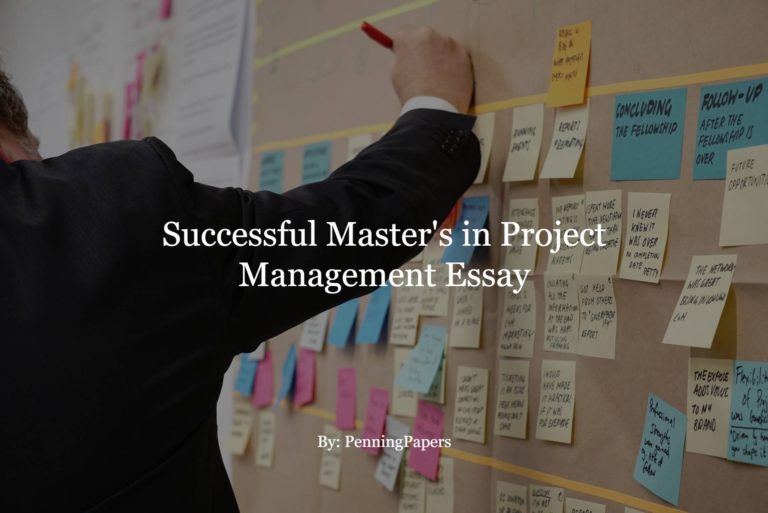We all know why you’re here reading this article: you need to write a winning Master’s in project management essay that gets your foot in the door.
Or… maybe it’s a Master’s in Investment Banking. Or… Quantitative Finance?
Frankly, it doesn’t really matter what the title is. This guide works very well for anyone looking for a successful business or finance Master’s essay that gets them into the program they want.
It’s important that you write a fantastic personal statement for your Master’s in Business or Finance because it can certainly make or break your acceptance. And, getting accepted into a great program can mean anything from getting a successful career that sets you up for life to successfully earning a higher position in an existing company.

Woohoo!
But, let’s not get ahead of ourselves.
Writing a personal statement at the Master’s level isn’t a walk in the park. Even existing college admissions consulting and advising firms take many hours to create something solid.
So, writing a successful Master’s in Project management personal statement isn’t going to be easy.
In fact, you’ll be competing against a large pool of equally compelling and competitive applicants vying for a position. Depending on the prestige and selectiveness of the program, you may need to be very particular with your words to secure your chances of success.

Fortunately, we’re going to be showing you exactly how to do that. And, our example project management essay serves as a great guide to knowing how much effort it takes to write a winning personal statement.
In this article, we’ll be covering one of our successful Masters’s in Project Management essays and the reasons why it worked. You can see the full personal statement below, including the elements that made it successful.
Note: Keep in mind that every application is different. What may work for one Master’s applicant may not work for another depending on their background.
Table of Contents
- Example “Why Study Project Management” Essay That Worked.
- The Elements of a Successful Project Management Essay.
- Sample Format for Statement of Purpose for Master’s in Project Management.
Professional College Application Help.
Contact us. We'll get to you within 24 hours.
Example “Why Study Project Management” Essay That Worked.

For this example, we took one from our clients who received our help for their Master’s program in Project Management.
We were quite proud of this one, especially since our client ONLY applied to USC for their Master’s. They didn’t have any other schools in their application list.
This is quite risky, especially since most students are encouraged to shotgun their applications. Shotgunning refers to the college admissions practice of applying to a large number of schools in order to guarantee acceptance into at least a few schools. This is particularly important for students whose employers plan to pay for their education.
You can find more about shotgunning in this section of our sister article here:
Below we’ve pasted the USC Masters PM Statement of Purpose prompt plus our successful essay.
USC Project Management Statement of Purpose
You must submit a Professional Statement of Purpose, approximately 500–1,000 words addressing the following questions:
USC Bovard College Project Management Program –Official Website
- Why are you pursuing the Master of Science in Project Management degree?
- How will the degree help you in your career?
- Why is the program at USC Bovard College a good fit for you?
“Every moment of my life has led to this. Although rather exaggerated, It’s true. All my experiences have prepared me for the world of project management. For as long as I can remember, I’ve had a systems-based mindset in structuring my goals and ambitions. This translated into every aspect of my life. I used spreadsheets to analyze the quality of my workouts. After earning a Brown Belt in Brazilian Jiu-Jitsu, I coached children on the many methods of pretzeling oneself into grappling positions through organizing techniques. After becoming a father during my second year of college, I kept “Dad stuff” organized through Omnifocus. Despite many others’ doubts, this system appears to hold. 20 years later: I’ve been the best father I could be, my daughter —born to teenage parents— is now a sophomore thriving at USC, and I’m 4 weeks away from graduating with my Bachelor’s at the University of Washington. And, the spreadsheets kept my waistline.
These systems-based victories empowered me more now than ever before to make the most of my next primary goal: pursuing a Master of Science degree in Project Management at USC.
For well over 10 years, I’ve had the privilege of managing and overseeing projects from conception to completion. In that time, I’ve learned how even minor components can change the ROI on operations completely; even slight optimizations in efficiency —which are often costly enough to raise hairs— can make or break a project. As such, my career has put me in a position of overwhelming responsibility —one where the right decisions can help not only my clients but their customers’ well-being too.
Thus, I have a moral and personal duty to learn everything I can about project management. An MS in Project Management is perfect for this. In particular, this is where USC comes in.
Currently, I work with Proficient Rx: a pharmaceutical company providing prescription dispensing services to institutions. I’ve streamlined the prescription logistics process —one example being leading and launching a prescription dispensing software for Amazon|Oasis Medical Group through a Virtual Primary Care Clinic in Seattle. This provided frictionless access to Primary Care prescriptions for on-campus Amazon employees.
Managing medical logistics requires overseeing many moving parts. By earning my degree at USC, my decisions will be backed by the comprehensive knowledge of a world-class education. For the well-being of my clients, customers, and employees, I wish to empower my decisions with the support and education of a MSPM here.
The world of pharmaceuticals is sophisticated and ever-evolving; thus, I require the research-based theoretical approach to project management USC affords. Without an understanding of the advanced theories academia affords, my efficiency is not at peak performance. Cutting edge best practices and ideas will maximize my ROI.
In particular, I have found that Professor Shawn D. Belling’s extensive background in bio-pharma, manufacturing, and software parallels much of my work. I would love to learn from his experiences and translate his knowledge into practice at Proficient Rx. Other professors, such as Michael Faia, have comprehensive knowledge of drug development and delivery that are within my industry but outside my domain of authority. Understanding the development and delivery side —along with his expertise working with renowned companies like Johnson & Johnson, MedImmune/AstraZeneca, and Jazz Pharmaceuticals— would give me a more comprehensive perspective on my work. I’d love to learn how to reduce operational costs whilst streamlining the medicinal distribution pipeline without incurring hiccups.
Bovard’s course content also revealed useful management methodologies I’ve yet to employ, especially with Agile. When I led my team overseeing the beta release of a new virtual primary care pilot, I found my work required systematizing and organizing many moving parts. I’d manage the release of pharmaceutical logistics software. So, systems like Agile would streamline my work wonderfully. Of course, nothing is absolute. Thus, USC’s combination of traditional and hybrid management methods gives my education a more nuanced perspective.
USC’s course on Risk Management would streamline my projects. Risk in my work involves medical purchases in large quantities. One notable example involves the CoronaVirus. The pandemic’s closures led to medication supply issues —especially overseas. To combat this, I made projections, calculated risk, and inexorably settled on a two-year inventory to ensure uninterrupted supply. The uncertainty of closures, supply chain disruptions, and expiration dates posed a massive problem. My team and I were fortunate to be one of the few who maintained continual supply and service. But, USC’s comprehensive RM course would help me develop the calculative mindset needed to handle the prediction-intensive strategies of risk whilst overseeing budget, team workflow, and other moving parts.
I’ve still much to learn; but education is just half of the equation. The other half is in the community. USC’s deep tradition of camaraderie and team spirit parallels the business spirit. I feel there’s a lack of “soul” in modern corporate culture that gives businesses the invigorating, richly powerful experience that constitutes leadership and management. As an aspiring Trojan, I hope to weave that culture into my company and integrate it into future projects. I hope to make meaningful, valuable relationships with others striving for the same ambitions. USC’s camaraderie culture is a meaningful networking tool that breathes life into the business journey. Should I be accepted to USC, I am certain to fight on alongside fellow Trojans and pave the way toward a great business adventure.”
Successful USC Project Management Statement of Purpose –PenningPapers Client 2023
The Elements of a Successful Project Management Essay.

There are a few interesting elements to this essay that made it successful.
We’re just going to discuss 4 primary elements of this essay that made it a winning one. We’ll also discuss how you can incorporate these elements into your own essay to hopefully get into the Master’s program of your dreams.
Flow and Readability.

It’s safe to say this example successful essay had quite a lot of details.
There are details about personal life, work, and the program’s fit with their future career success.
More often than not, students are going to be juggling a lot of details as well. In doing so, you’re going to need to keep your ideas and brainstorming topics all neat, tidy, and organized. This is especially going to help with the general flow and readability of your Master’s personal statement when the admissions office reads it.
Pay attention to our example essay’s use of transitions, punctuation, and sentence length. These three factors are going to make or break your essay’s flow.
Let’s cover transitional phrases first.
Transitional phrases such as “In addition”, “Therefore”, and “As such” are great ways to string clauses together without sounding choppy. By using transitional phrases in your college essays, the admissions office can follow along with your line of logic without getting lost.
Here’s an example.
“For well over 10 years, I’ve had the privilege of managing and overseeing projects from conception to completion. In that time, I’ve learned how even minor components can change the ROI on operations completely; even slight optimizations in efficiency —which are often costly enough to raise hairs— can make or break a project. As such, my career has put me in a position of overwhelming responsibility —one where the right decisions can help not only my clients but their customers’ well-being too.
Thus, I have a moral and personal duty to learn everything I can about project management. An MS in Project Management is perfect for this. In particular, this is where USC comes in.“
Example of Transitional Phrases in the Master’s in Project Management College Personal Statement
Normally, this would be quite a lot of information packed into just a few lines. In addition, the diversity of sentence structure allows for these paragraphs to squeeze in more info through appositives and other structures framing the clauses.
However, transitional phrases such as “As such” and “Thus” bring a smoothness between independent clauses to string the ideas together seamlessly.
This doesn’t mean you need to use transitional phrases in every sentence. You don’t want to overwhelm admissions officers with them. Just be sure to use enough transitional phrases to bring seamlessness to the reading experience without overdoing it.
You can even read it out loud to others and see whether they believe it sounds choppy. At the end of the day, use your judgment as a reader and listener!
Okay, now let’s talk about punctuation.
The great thing about punctuation is that you can make otherwise complex ideas packed with details and externalities easy to understand. For instance, using appositives with the em dash or comma can help you fit in extra details that regular sentences probably don’t have the space to fit.
Similar independent clauses can be strung together using a semicolon rather than a period to make the reading experience smoother without too much choppiness or unnecessary stops.
There are a plethora of creative ways punctuation can make your writing flow better. But, it’s always best to seek the aid of multiple eyes. That is, ask your friends, teachers, or even a professional college admissions essay expert to review your writing and change it to be more streamlined.
Last but not least: sentence length.
Varying the sentence length in your college essays is one of the easiest ways to make your writing look smoother and smarter.
All you need to do is make sure each sentence has a different number of words.
Trust us: it helps.
How much?
Well, let’s take a look at a classic example.
Having sentences of similar length is one of the most common mistakes people make in their statement of purpose.
By varying the length of sentences (and even the length of paragraphs) you can make the flow of your writing much easier to follow. And, the admissions officers will have an easier time understanding your writing from the get-go. They can simply skim through your content easily without having to reread and painfully parse through your writing.
Indicate to Admissions Officers How the Master’s Program Will Help. Don’t be Vague.

One of the more common mistakes we see in student project management statements of purpose is vagueness. This is especially true for students who don’t have enough work or internship experience to draw from to answer the prompt.
If you are one of these students, don’t be vague.
It may be tempting to use vagueness to obscure the fact that you don’t have much experience to write about. But, admissions officers can see through this.
If you are vague in your project management statement of purpose, admissions officers will infer you have no substance worth mentioning.
The key, therefore, is to be as specific as possible.
Now, when it comes to discussing how the Master’s program may help you in your future career aspirations, you also need to be specific. There’s no room for vagueness here. Your readers want to see that you have a plan. It shows the initiative and foresight needed to succeed.
One of the best ways to be specific about the benefits of your Master’s program is to map out a timeline for how the program will help you.
So, here’s an example:
Break down your future in blocks.
The first block covers your experience taking the Master’s program in project management. The next block covers the first 5 years after the program. The next block after that covers the next 10 years.
So on and so forth.
One of the things you’ll notice is the benefits that come with a Master’s in project management have rippling effects. That is, you’ll still benefit from the Master’s program many years later in your life.
In addition, the benefits may become more abstract as the years fly by.
Here’s an example.
- Master’s program at USC…
- Gives you a more comprehensive theory-based approach to management that will help with your career.
- Lets you network with other like-minded individuals with similar interests and passions in the field.
- Exposes you to a generalized educational experience you may otherwise not have.
- 5 years later…
- You can better help the company’s operations.
- You can earn a better living for yourself and perhaps even increase wages + quality of living for coworkers and the team.
- You become more familiar with complex management and project operations principles at the muscle-memory level.
- Deeper connections with fellow classmates provide you a more fulfilled life outside of corporate work.
- 10 years later…
- You develop passions and interests outside your current industry. (fiction writing as an example)
- You employ the help of editors and writers to help you with your endeavors.
- You translate your operations and project management experience into your creative writing to serialize content at a faster rate than most others in the industry.
Note that this is just one example. You don’t have to follow this format; but, it’s just one way of going about it.
Being this specific with how your education will support your future is going to help convince admissions officers that you know what you’re talking about.
Here’s a good rule of thumb: imagine yourself as an outsider when reading your Master’s statement of purpose. Look at the reasons why you want to apply, and imagine whether or not a regular person would find it reasonable.
This is a good rule since most students who are writing the Master’s statement of purpose are looking to impress the admissions office. When they write with impressing readers in mind, they forget to think about what they REALLY want.
Ultimately, this just looks disingenuous.
By imagining yourself as an outsider, you will inexorably have an easier time seeing whether your writing seems logical.
Find Elements That Make the Program Suitable for YOU.

This is going to be a hard one.
Generally speaking, most Master’s programs are relatively similar. Although most schools may have differences depending on the resources, opportunities, environments, and campus culture, any Master’s program is most certainly going to prepare you well for your future.
This makes distinguishing a Master’s program, let alone a project management one, a difficult task.
If you’re looking to write a strong Master’s in project management essay that gets you accepted, you’re going to need to get specific about how the program you’re applying for is better than any other program available.
Realistically, this is not entirely doable.
Since most Master’s programs are generally similar to other ones, you’ll have to find the minor unique attributes of a particular program that may actually have immense benefits to your future endeavors and ambitions.
Note: the keyword here is that it should fit YOU.
For instance, our example Master’s in project management essay covers some of the details that make USC a great place for our client. They were able to dig into some of the specific elements of the program such as professor content and campus culture that would help qualify their experience in project management in the career and later in life.
When writing your project management statement of purpose, be sure to look into faculty and professors working in the program you’re applying for. If their course content or background research parallels with some of the work you’re doing, you can draw connections between that to make an argument for why you deserve to attend.
Look for Traits in the School That Help in Unconventional Ways.

Some people assume that a Master’s program is something that would help in their careers only.
Although a Master’s in project management would help with your career, it’s a fantastic path to helping in other dimensions of your life. Chances are, the school you’re applying to is going to have an interesting impact on other aspects outside of academics and work.
Let’s take our example Project Management essay again.
“I’ve still much to learn; but, education is just half of the equation. The other half is in the community. USC’s deep tradition of camaraderie and team spirit parallels the business spirit. I feel there’s a lack of “soul” in modern corporate culture that gives businesses the invigorating, richly powerful experience that constitutes leadership and management. “
Example of Unconventional Benefits in the Project Management Essay –PenningPapers
USC has a fantastic culture and wonderful community that is great for lasting friendships and connections. It’s this community that gives the campus a great sense of pride and camaraderie that many other campuses don’t have.
This aspect can give the campus a much greater benefit to the applicant in ways originally unintended. It can help with not just the career but also benefits in personal, philosophical, and spiritual ways.
When you think of the college application process outside of just the academics and career benefits alone, you’ll find that the campus you’re applying for may have a lot more to offer you than you think. That’s what you want to write about!
Sample Format for Statement of Purpose for Master’s in Project Management.

Okay. Our example project management essay was rather unique in content.
So, it can be quite confusing to know how to format the Statement of Purpose if you have different topics and ideas to talk about. The formatting for the Master’s Program Statement of Purpose can be especially confusing for students who don’t have content they can write about.
Students without much extensive work experience or reasons for applying may find themselves stuck with writing.
Thus, we’ve created a general list of topics you should write about in descending order in your essay.
- Intro: Personalized intro paragraph about who you are and what kind of person you’re like.
- Body Paragraph 1: Tie in the first paragraph to how your temperament and personality match with the respective program you’re applying for. (Example: organization for project management and people skills for consulting.)
- Body Paragraph 2: Answer the prompts directly.
- Body Paragraph 3 and onwards: Explain your answers to said prompts and separate the topics by paragraph.
- Conclusion: Demonstrate your interest in the program and explain how you would attend if you’re accepted. If needed, show proof of this.
Note that you’re not obligated to follow this format exactly. This is just an example of a format that you can use that would make the personal statement easy to read.
If you’re still unsure about how to write the project management essay for college applications or need help with any Master’s program personal statements in general, don’t fret! Contact us for a free phone consultation! Our college admissions experts and advisors can provide you with the expert advising and editing you need to craft a winning Master’s essay that gets your foot in the door!


